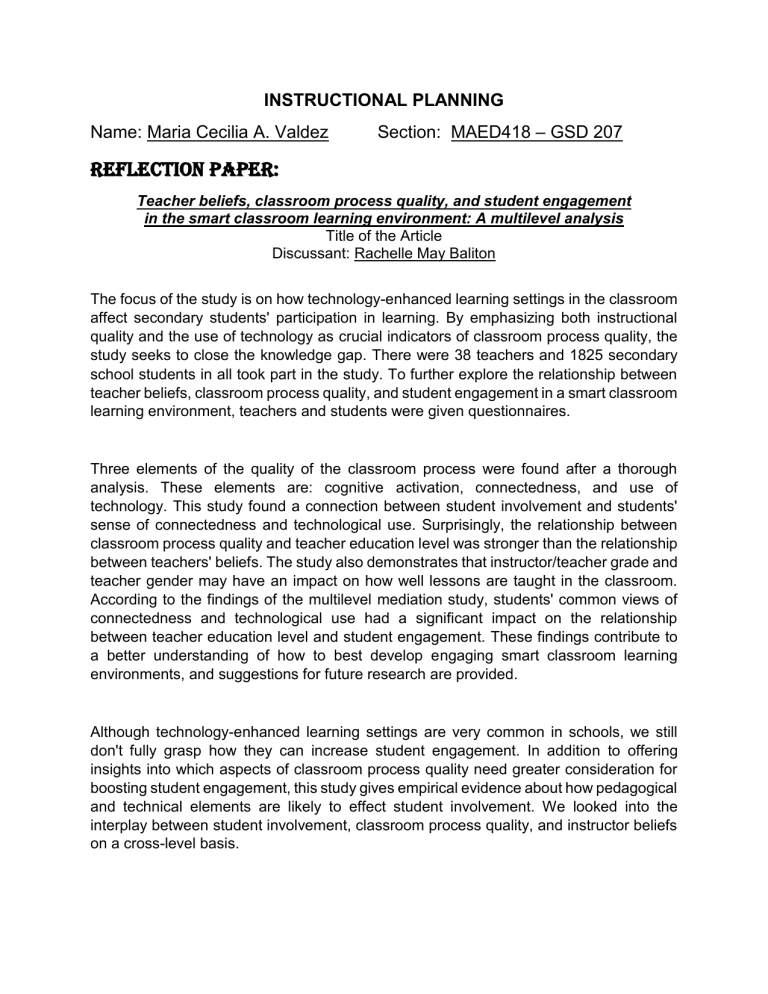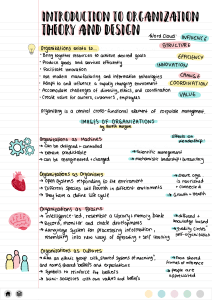
INSTRUCTIONAL PLANNING Name: Maria Cecilia A. Valdez Section: MAED418 – GSD 207 REFLECTION PAPER: Teacher beliefs, classroom process quality, and student engagement in the smart classroom learning environment: A multilevel analysis Title of the Article Discussant: Rachelle May Baliton The focus of the study is on how technology-enhanced learning settings in the classroom affect secondary students' participation in learning. By emphasizing both instructional quality and the use of technology as crucial indicators of classroom process quality, the study seeks to close the knowledge gap. There were 38 teachers and 1825 secondary school students in all took part in the study. To further explore the relationship between teacher beliefs, classroom process quality, and student engagement in a smart classroom learning environment, teachers and students were given questionnaires. Three elements of the quality of the classroom process were found after a thorough analysis. These elements are: cognitive activation, connectedness, and use of technology. This study found a connection between student involvement and students' sense of connectedness and technological use. Surprisingly, the relationship between classroom process quality and teacher education level was stronger than the relationship between teachers' beliefs. The study also demonstrates that instructor/teacher grade and teacher gender may have an impact on how well lessons are taught in the classroom. According to the findings of the multilevel mediation study, students' common views of connectedness and technological use had a significant impact on the relationship between teacher education level and student engagement. These findings contribute to a better understanding of how to best develop engaging smart classroom learning environments, and suggestions for future research are provided. Although technology-enhanced learning settings are very common in schools, we still don't fully grasp how they can increase student engagement. In addition to offering insights into which aspects of classroom process quality need greater consideration for boosting student engagement, this study gives empirical evidence about how pedagogical and technical elements are likely to effect student involvement. We looked into the interplay between student involvement, classroom process quality, and instructor beliefs on a cross-level basis. First, whereas other teacher characteristics such as gender, education level, and teaching grade significantly influenced at least one aspect of the quality of the classroom process, teacher beliefs were unrelated to cognitive activation, connection, or the use of technology. In addition to the important roles played by student and teacher characteristics (such as student gender, teacher education level, and year of instruction), students' perceptions of connectedness and the use of technology at both the individual and classroom levels positively influenced their engagement, whereas only individual perceptions of cognitive activation explained differences in student engagement. Third, kids were more engaged with teachers with greater education levels, but this was only true for teachers who used more technology and showed higher levels of connectivity. This study has various applications for creating conducive circumstances for a stimulating smart classroom learning environment. This research only emphasizes the importance of teachers and their instruction, which suggests that substantial funding and support are needed for future teacher practices in technologically advanced classrooms.



